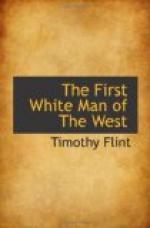The inhabitants, exasperated by the recital of cruelties to the children and women, too horrible to be named, put themselves under the standard of the intrepid and successful General Clarke, who commanded a regiment of United States’ troops at the falls of Ohio. He was joined by a number of volunteers from the country, and they marched against Pickaway, one of the principal towns of the Shawnese, on the Great Miami. He conducted this expedition with his accustomed good fortune. He burnt their town to ashes. Beside the dead, which, according to their custom, the Indians carried off, seventeen bodies were left behind. The loss of General Clarke was seventeen killed.
We here present brief outlines of some of the other more prominent western pioneers, the kindred spirits, the Boones of Kentucky. High spirited intelligent, intrepid as they were, they can never supplant the reckless hero of Kentucky and Missouri in our thoughts. It is true, these men deserve to have their memories perpetuated in monumental brass, and the more enduring page of history. But there is a sad interest attached to the memory of Daniel Boone, which can never belong, in an equal degree, to theirs. They foresaw what this beautiful country would become in the hands of its new possessors. Extending their thoughts beyond the ken of a hunter’s calculations, they anticipated the consequences of buts and bounds, officers of registry and record, and courts of justice. In due time, they secured a fair and adequate reversion in the soil which they had planted and so nobly defended. Hence, their posterity, with the inheritance of their name and renown, enter into the heritage of their possessions, and find an honorable and an abundant residence in the country which their fathers settled. Boone, on the contrary, was too simple-minded, too little given to prospective calculations, and his heart in too much what was passing under his eye, to make this thrifty forecast. In age, in penury, landless, and without a home, he is seen leaving Kentucky, then an opulent and flourishing country, for a new wilderness and new scenes of adventure.
Among the names of the conspicuous backwoodsmen who settled the west, we cannot fail to recognize that of James Harrod. He was from the banks of the Monongahela, and among the earliest immigrants to the “Bloody Ground.” He descended the Great Kenhawa, and returned to Pennsylvania in 1774. He made himself conspicuous with a party of his friends at the famous contest with the Indians at the “Point,” Next year he returned to Kentucky with a party of immigrants, fixing himself at one of the earliest settlements in the country, which, in honor of him, was called Harrodsburgh.




